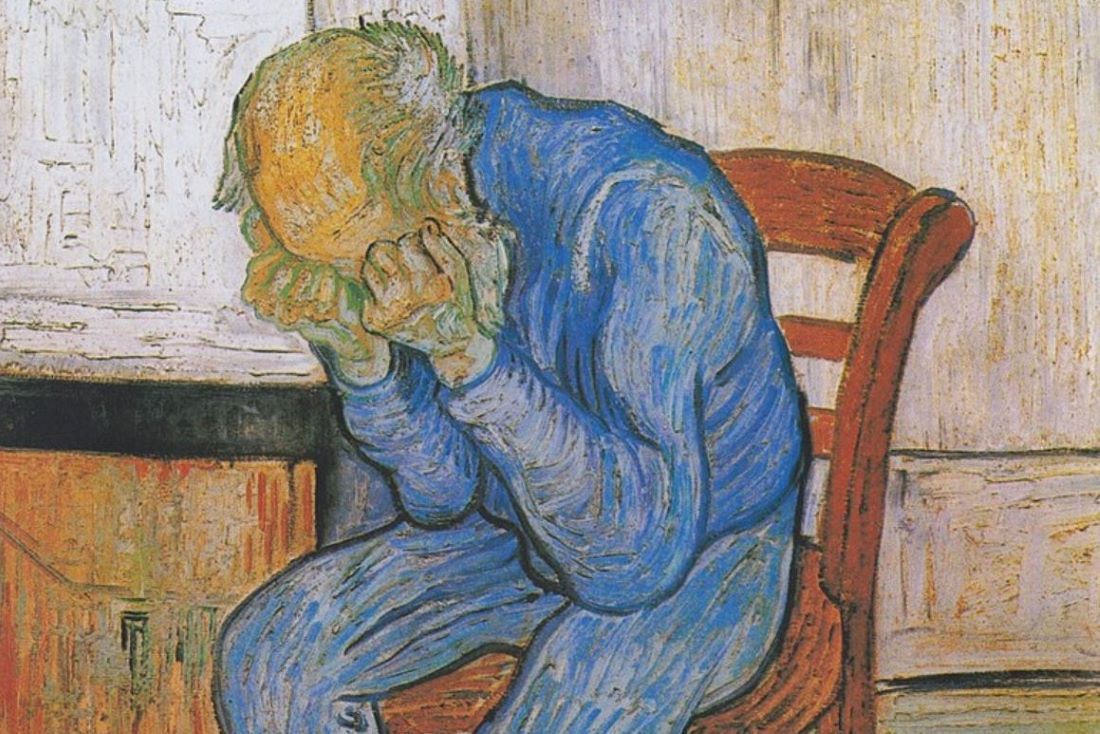We must possess a persevering joy, but to acquire it we must be detached from ourselves. One is only ill-humored if one is in some way attached to oneself. As far as it depends on us, we must push away the cloud; otherwise, wait with patience.
—Dom Guéranger (quoted in Cécile Bruyère’s Portrait of Dom Guéranger)
It’s not a matter of toughing it out, but of submitting yourself uncomprehendingly to the process. Fight against anxiety as best you can, don’t look back, and trust what God is accomplishing, letting go of any attachment to your own understanding, tastes, feelings, imagery with regard to God. There is no magic wand . . .
I do think the key to all this is a greater acceptance of your own reality and of reality generally: the constant interplay of nature and grace, Cross and Resurrection. You do take great delight in the things of God, and you are so nourished and delighted by Scripture and the liturgy. You are utterly important to God—you can afford to relax the grip a bit, and let him look after you and love you.
Renew your fundamental intention to give God everything. You fulfill your daily duties with such generosity, whether the work is pleasant or unpleasant, and this is a joy to behold. Well then, apply this attitude also to your life of prayer. Even in spiritual exercises we must be indifferent and persevere whether they are pleasurable and satisfying or not. You do it beautifully in the rest of your life: the practice of prayer is no different. There has to be detachment with greater involvement, and the one does not rule out the other.
+
Our difficulties, whatever they may be, can all be used. They are redemptive. Many, many saints experienced various degrees of mental and emotional suffering and anxiety, and their experience, painful as it was, had profoundly spiritual effects on themselves and others. The anxiety is true at the level of felt experience, but at a deeper level, at the level of spirit and faith, something quite different may be happening. Even in anxiety one can have a real sense of God’s love and possess faith.
And it’s important to recognize that feeling low, depressed, is an emotional state, not an action. This does not cut you off from God in any way. Those who suffer this affliction have not yielded to it, any more than one yields to a broken arm or leg. So it is never a question of yielding to a sinful action—that would be a far deeper wound—but rather a condition.
But this condition is not meaningless. Prayers to God for help and relief are real prayers and signs of an active faith, hope, and love. This recognition of our need of God, and learning to trust him, are very precious. In all these ways there can be real growth in the midst of, and in spite of, anxieties. Also, these experiences, painful as they are, often bring a deepening compassion for others. All of us have something to carry—whether physical or moral or spiritual—and, united to Christ, these become fruitful for ourselves and others.
+
Do not think that because you feel terrible you are doing something terrible. It is quite the contrary. It is your mind (your good mind) that will tell you that you are doing what you must; it is your will that gives you the strength to do it. That’s the great thing. Ask God to grant you feelings corresponding to your resolution, by all means, but the great thing is to do God’s will, what you know to be the good and right thing.
It’s like sorrow for sin. That’s an act of will, which can be quite compatible with the lack of any feeling whatsoever. Obviously it is a help if, besides being sorry, we can feel it, but we cannot control our feelings.
+
Make up your mind not to indulge in any more “what ifs”; looking ahead in this way is contrary to reason and faith. Endlessly going round in circles (“what if?,” “It’s going to be this way or that way,” etc.) is a way of escaping pain. And as we know from Christ’s Cross this is not the way to handle pain. Suffering can be embraced, transcended, used.
It seems to me that when we allow ourselves to look ahead and become discouraged, it usually means we are focusing too much on ourselves. The true grace is to forget oneself, and living in the present moment helps us to do that and gives us the strength and courage to respond.
+
The readings at Mass today are for you! Prayer is a combat, a struggle with God, like Jacob all night even to the break of day (Gen. 32. 22–32), like Moses with his hands in the form of a cross to support his companions (Ex 17. 8–13), like Jesus in his long prayer of agony and offering in the night of Gethsemane (Lk. 22. 39–46). That’s what he tells us in the gospel today (Lk. 18.1–8): cry out to God day and night, pester him with that persevering prayer which is really another name for faith and love. And this fidelity in love is going to have to endure silence sometimes, without our ever doubting him, just as we accept that those whom we love may remain silent and we don’t think of doubting them.
And there’s another thing about prayer – it always changes us, puts us back on our feet as it were. Think of Jesus in Gethsemane prostrate, then renewed, standing up after his long prayer:
If he seems to forget me, very well, he is free to, since I am no longer mine, but his . . . He will weary of keeping me waiting sooner than I of waiting for him (St. Thérèse of Lisieux, Letter 81).
When she feels herself to be forgotten, St thérèse also interprets this as a sign of how the Divine Shepherd trusts her, for he leaves his faithful sheep to bring back those who are lost (St. Thérèse of Lisieux, Letter 121). How I am touched by this trust.
+
The devil can cause suffering, but it is only Christ and the Cross that teach us how to use suffering, to make it redemptive for ourselves and for the whole world, in union with him. We can become co-workers with him. Pain is not the final word. And peace lies in gratitude and acceptance.
+
As I was saying, at times like these, the mysteries of Jesus are no longer outside us but are now our life. We are living the Mass. The mystery of suffering and the Cross become ours in a quite different way.
There is, as you have said, a temptation to abandon or curtail prayer. Sometimes it may help to give the mind something to occupy it, a vocal prayer. But even then your energy should be concentrated on surrendering to God, just as you are, bearing the weight of your helplessness and poverty. Remember it is intention not attention that is all-important. Intention is within our power, attention is not.
In all this, it is important to go forward, trusting in God absolutely. It takes much courage and trust to pursue this path. This act of trust in itself is pleasing to him. It is indeed what he is working to get from us! It is all that matters to him.
The deep self, its total orientation toward God in prayer, the choice of God alone: all that can be there even when the mind is distracted. One can be living intensely in God with nothing to show for it on the surface, with no conscious desire for him. It’s a bit like St Antony saying we are most truly praying when we do not know that we are.
Ultimately trust is the answer, trust in God who never disappoints.
+
Don’t panic if you feel fear. After all, Christ himself took something of our fear and anxiety upon himself when he became man. From the perspective of the Cross, fear can be fruitful when turned to God; and at the same time, we can say our human fear has been definitively conquered by the Cross.
The experience of fear in our hearts doesn’t mean we cannot be courageous. Being really brave means embracing the Cross in the midst of fear, even while we are fighting against it, like Jesus in the Garden of Olives. That’s the kind of courage the martyrs showed. The Lord is never closer to his own than at these moments. That kind of courage-in- the-midst-of-fear is the greatest witness to belief in God and the power of his love for our healing and our good.
+
Go forward in great courage and confidence; hold on in all patience. To keep looking back is not good for you or your furrow—and it can be an escape from the real work of trust and love. I believe in your faith, even if it seems hidden away underground, like those deep springs—and as full of life! Trust God absolutely day by day for all things great and small, God who “ne’er betray’d man’s trust” as Henry Vaughan put it. Never let yourself look back, nor pull everything apart in “cogitations,” but take your life whole, uncomprehended, but entirely trusted to God’s loving keeping. We simply can’t understand everything. And never let go of the belief that he is the all-Good.
+
The trials you describe so well, especially the sameness of it all, are a precious opportunity, a training ground, to help you become really detached from yourself. Try to see it as an opportunity for growth in love and an increase in capacity and a greater grounding in patience and trust. This gentle turning to God in rain, fog, sleet is so precious.
But there’s more: all this is given, “measured out” to you to reveal the supreme importance of charity, the real proof of love for God. Only he can bring about perfect love—given how what appears to be pure love can often be riddled with selfish motives. Here is the way we die to self—and the way Christ triumphs in us: “It is good that you have humbled me that I may know your commandments,” as St. Benedict reminds us. Make up your mind to give God everything, internal and external, making his good pleasure all your joy.
+
I want to clarify (and assure you) about the nature of the present moment and its relation to the future. As we see with Jesus’s agony in Gethsemane, our human nature gives us this capacity of suffering now the anticipated pain of the future. As you said, the pain you feel is in the present moment. It is precisely a present pain. We have to carry the Cross of the moment.
The impact of the present moment brings the duty not just of acceptance but of responding. There is only one moment of time, namely this present moment, which contains what God wants and which enables us to be united to him. The past has gone; the future has not arrived. True, the past may throw a shadow forward to the present moment: you may have to say sorry or thank you or make an act of contrition or pay a debt. And the future may throw a shadow backwards to this moment: I may have to prepare for an exam or a lesson in choir or write a letter for someone’s birthday. But we cannot step into that moment.
Keeping one’s eyes too much on the past or future is like trying to suffer last week’s headache today, or next month’s toothache. That would be to carry an unbearable yoke of one’s own making, not the Lord’s sweet yoke, which is always bearable because it’s the one he gives us.
Stay close to Jesus at Gethsemane in this present pain: he too fell on his face finding it too much, he too struggled to surrender (“not my will but thine” [Luke 22:42]) and found his comfort in prayer, appealing to the Father. May you too be comforted by an angel and find his courage.
Reprinted with permission from:
BLOOMSBURY CONTINUUM
Bloomsbury Publishing Plc, London, UK
Taken from The Joy of God: Collected Writings
Copyright © The Estate of Sister Mary David Totah
Foreword © Erik Varden


